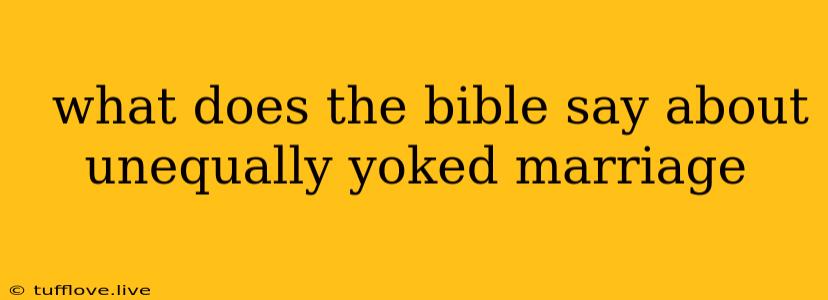The concept of an "unequally yoked" marriage is a topic that has been a source of much discussion and debate among Christians. Derived from the biblical passage in 2 Corinthians 6:14, the phrase "unequally yoked" carries significant weight for believers seeking guidance on relationships. It warns against forming close partnerships with those who do not share the same faith, suggesting potential spiritual conflict and challenges. This article delves into the meaning of an unequally yoked marriage, exploring its biblical context, implications, and the complexities that arise when interpreting this passage in the context of modern life.
Understanding the Biblical Context
The passage in 2 Corinthians 6:14, which reads "Do not be unequally yoked together with unbelievers. For what fellowship has righteousness with lawlessness? Or what communion has light with darkness?" serves as the foundation for the concept of an unequally yoked marriage. The verse uses the analogy of a yoke, a wooden frame placed over the necks of two oxen to work together, to illustrate the potential consequences of uniting individuals with differing beliefs.
Implications of "Unequally Yoked"
This passage suggests that a partnership between a believer and a non-believer is likely to encounter challenges, drawing attention to the potential conflicts that can arise from:
-
Different Spiritual Priorities: A believer's life is naturally shaped by their faith, influencing their values, decisions, and overall outlook. An unbeliever, on the other hand, may hold different priorities, leading to potential clashes in areas like family life, religious practices, and moral values.
-
Spiritual Growth and Development: Sharing faith and supporting each other's spiritual journeys is a fundamental aspect of a Christian marriage. An unequally yoked marriage can hinder the growth and development of both individuals, as one partner may feel limited or pressured to compromise their beliefs.
-
Disunity and Discord: Divergent perspectives on faith and life can create a sense of disunity and discord in the relationship. This may lead to conflict, misunderstandings, and a lack of shared understanding on crucial matters.
-
External Pressures: The unequally yoked marriage can face external pressures from family and community members, who may hold different perspectives on the relationship and its implications.
Interpreting the Passage: Applying Scripture to Modern Life
While the passage in 2 Corinthians 6:14 clearly warns against forming close partnerships with unbelievers, applying this principle to unequally yoked marriages in the 21st century requires careful consideration.
Nuances of Interpretation:
-
Focus on the Heart: Some argue that the passage emphasizes the potential for spiritual discord arising from a misalignment of beliefs and values rather than solely focusing on the presence or absence of faith. In this interpretation, the emphasis is on the spiritual direction of the partners rather than their formal religious affiliation.
-
Context Matters: The passage was written within a specific historical and cultural context, where faith was more closely intertwined with daily life. Applying this passage to modern society requires careful consideration of the diverse religious landscapes and individual circumstances that exist today.
-
Growth and Transformation: It is important to remember that individuals can change and grow, and someone who is not currently a believer may come to faith. The passage should not be interpreted as an absolute prohibition against relationships with those who do not share the same faith at the outset.
Navigating the Complexities of Unequally Yoked Marriages
While the passage in 2 Corinthians 6:14 provides valuable guidance for believers, navigating the complexities of unequally yoked marriages requires prayerful consideration and discernment.
Factors to Consider:
-
Genuine Commitment: The depth and sincerity of both partners' commitment to the relationship is paramount. Both partners should be committed to building a strong and loving foundation, regardless of their faith backgrounds.
-
Open and Honest Communication: Open and honest communication is essential for navigating the challenges that may arise in an unequally yoked marriage. Both partners need to be willing to communicate their needs and perspectives, even when they differ.
-
Respect for Differences: Respecting each other's beliefs and values, even when they differ, is crucial. Both partners need to be willing to acknowledge and respect the other's viewpoint, even if they don't agree.
-
Seeking Support and Guidance: Reaching out to trusted mentors, spiritual leaders, or couples' counselors for support and guidance can be invaluable in navigating the challenges of an unequally yoked marriage.
Conclusion:
The concept of an unequally yoked marriage raises important questions about faith, relationships, and the principles of biblical guidance. While the passage in 2 Corinthians 6:14 provides cautionary words about partnering with those who do not share the same faith, interpreting this passage in the context of modern life requires careful consideration and discernment. Ultimately, decisions regarding relationships are deeply personal and require careful prayerful reflection. By engaging in open communication, respecting each other's values, and seeking guidance from trusted mentors, individuals can navigate the complexities of unequally yoked marriages with a focus on love, respect, and spiritual growth.
